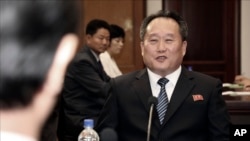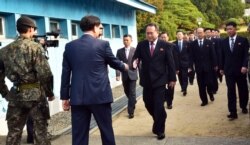North Korea has appointed a former military officer with a blunt-speaking reputation to be the country’s new foreign minister, the latest evidence Pyongyang may be realigning its foreign policy after apparently losing hope in nuclear talks.
North Korea has notified foreign embassies in Pyongyang that Ri Son Gwon has been named as foreign minister, a diplomatic source confirmed to VOA. The story was first reported by NK News, a Seoul-based online publication with contacts in North Korea.
The move comes as North Korea continues to boycott nuclear talks, amid frustrations Washington has not offered enough concessions. The appointment of Ri as foreign minister may be the latest evidence North Korea will take a hardline approach in 2020.
A former army colonel, Ri has relatively little diplomatic experience and apparently no history working on nuclear issues. Most recently, he was the chairman of the Committee for the Peaceful Reunification of the Country, which handles relations with the South.
He has led North Korean delegations for inter-Korean talks, including in 2018. During those talks, Ri gained a reputation for straightforward and sometimes standoffish behavior, according to South Korean media reports.
Policy still dictated by Kim
However, many analysts cautioned against reading too much into Ri’s reputation or background.
"North Korean diplomats can be both blunt or charming, depending on the situation. So his reported bluntness is secondary” to whatever message North Korea wants him to convey, says Ramon Pacheco Pardo, a Korea specialist who teaches at King’s College London.
"Policy decisions will still come from Kim Jong Un, not from the foreign minister. So in terms of substance, it does not matter much who is the foreign minister,” he adds.
Leif-Eric Easley, a professor at Ewha University in Seoul, agrees that the new foreign minister’s past experience and policy positions are “less important than what he is empowered to do by the Kim regime.
"Will he be entrusted with restarting denuclearization talks with Washington and inter-Korean exchanges with Seoul? Or will it be his job to stonewall [U.S. Secretary of State Mike] Pompeo and [U.S. North Korea envoy Stephen] Biegun while overseeing a pressure campaign including the demolition of South Korean-built tourism facilities at Mt. Kumgang? Recent signs from North Korea are not encouraging,” Easley said.
North Korea has not formally announced Ri as new foreign minister. It is not clear what happened to his predecessor, Ri Yong Ho, a career diplomat who served in the position for about four years. Some analysts have suggested that Kim may be reprimanding Ri for the failed nuclear talks.
"I agree that it’s a way to show displeasure with the lack of progress,” says Pacheco Pardo. “If there was a deal, I don’t think we would have seen the changes in personnel.”
Stalled talks
Kim Jong Un had set an end-of-year deadline for the U.S. to make a new offer in nuclear talks. After the deadline passed without any U.S. concessions, many analysts had expected him to lay out a starker “new path” for his country.
But Kim’s New Year’s comments were more pessimistic than provocative. Kim warned of a “long-term” standoff with the U.S. and said he no longer felt bound by his self-imposed suspension of nuclear and long-range missile tests. But he also did not rule out talks altogether.
Kim and U.S. President Donald Trump have met three times. In June 2018, they signed a vague agreement to work toward the denuclearization of the Korean Peninsula. The talks have been stalled since February 2019, when a Hanoi summit between Kim and U.S. President Donald Trump ended abruptly in no deal.
There are signs that the Trump-Kim diplomacy has reached its limit. Earlier this month, a North Korea foreign ministry official said that while the two men’s relationship remains “not bad,” talks would not resume unless the United States first unconditionally accepts the North’s demands.





